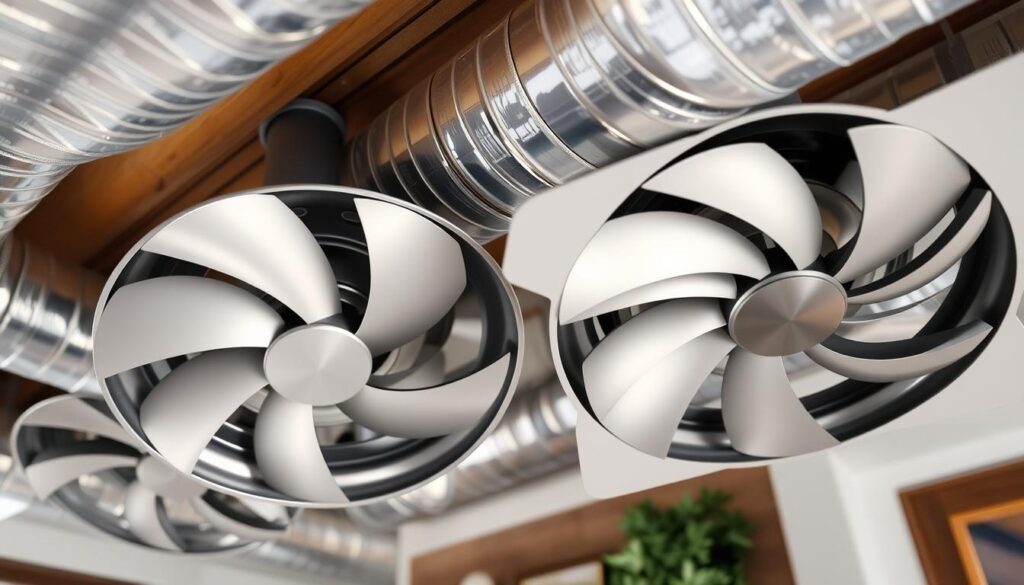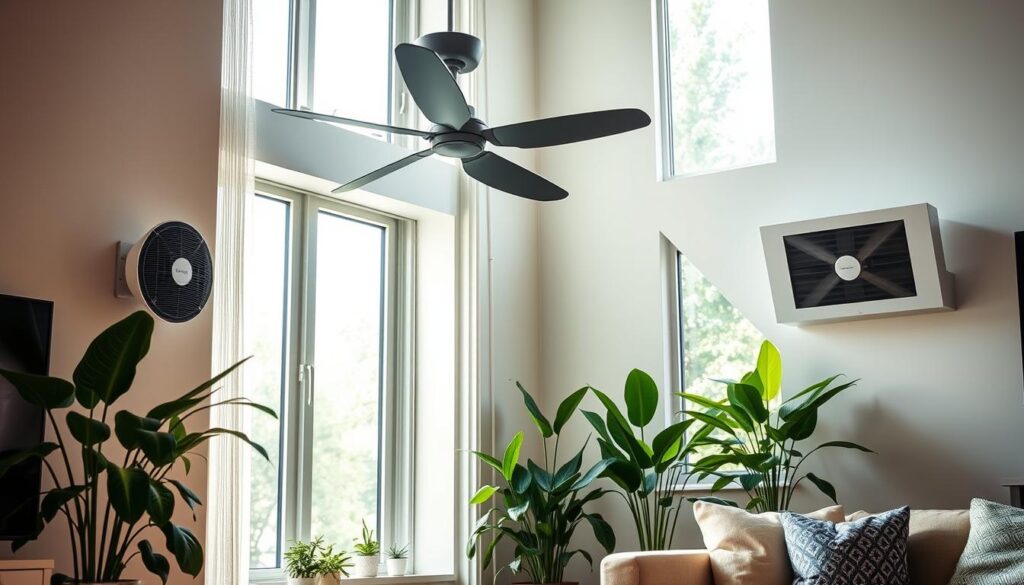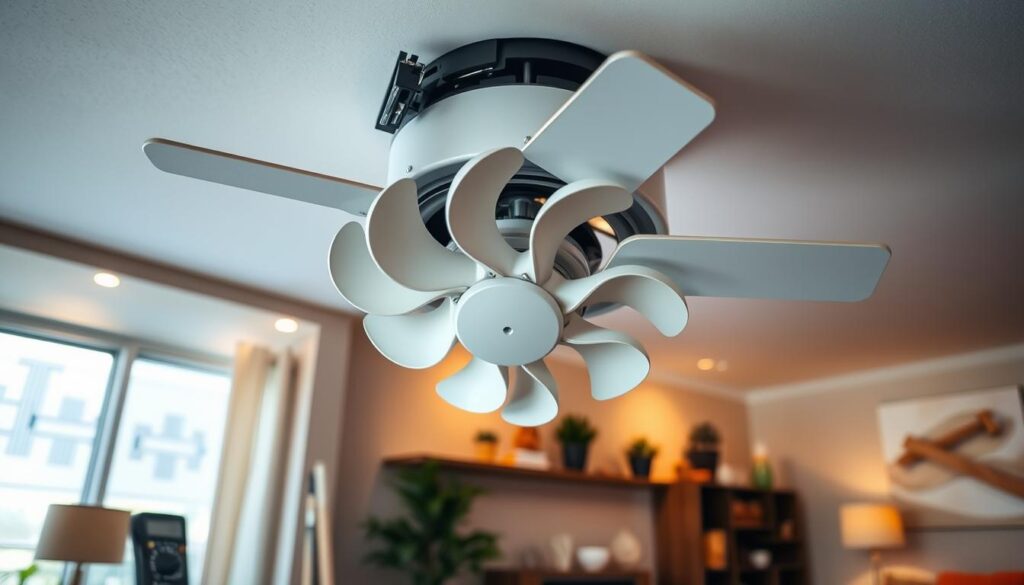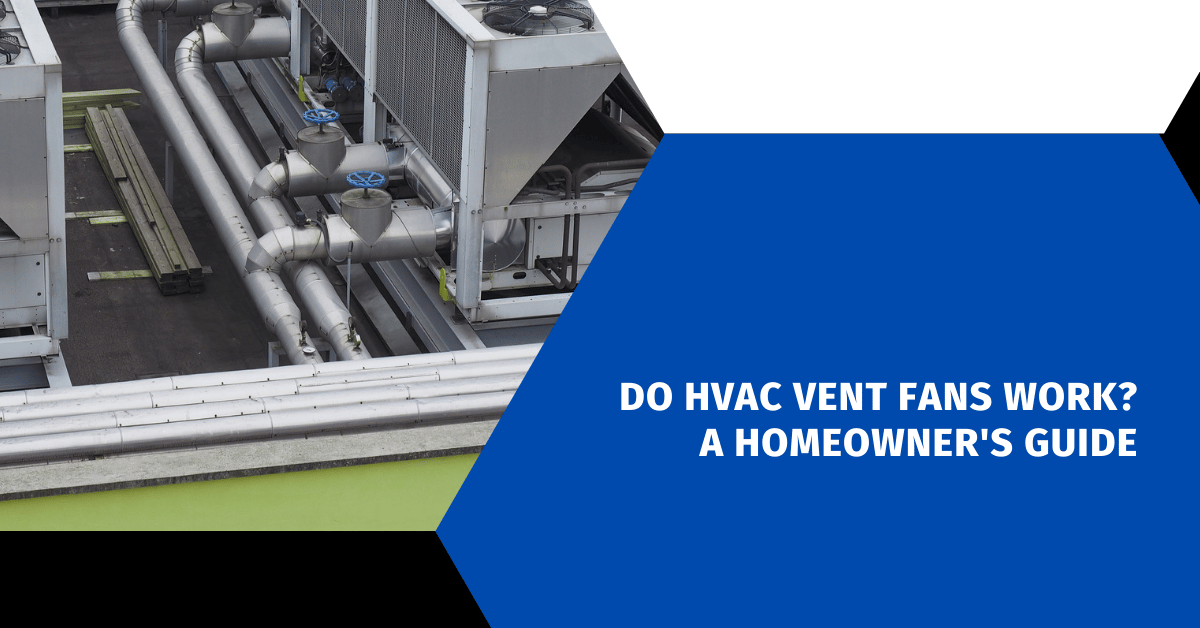Affiliate Disclosure
HVAC Guide Guys is a participant in the Amazon Services LLC Associates Program, an affiliate advertising program designed to provide a means for sites to earn advertising fees by advertising and linking to Amazon.
Do HVAC Vent Fans Work? As a homeowner, keeping your indoor air quality and comfort is crucial. You might wonder if HVAC vent fans really help. Are they worth the cost, or just a waste of money? This guide will look into how well HVAC vent fans work and if they really improve your air.

Key Takeaways
- HVAC vent fans are key for good indoor air and comfort by removing moisture, odors, and pollutants.
- Good ventilation is vital in modern, well-sealed homes to avoid mold and pollutant buildup.
- HVAC vent fans work by getting rid of stale air and bringing in fresh air, enhancing home air quality and comfort.
- Knowing the different types of HVAC vent fans and their uses can help you pick the best for your home.
- Proper installation and regular maintenance of HVAC vent fans are crucial for their effectiveness.
Table of Contents
Understanding HVAC Ventilation Basics
Proper ventilation is key in any HVAC system. It ensures air moves well and healthily in your home. Knowing about hvac ventilation helps keep your air clean and saves energy. Let’s look at different ventilation systems, mechanical ventilation’s role, and common problems in homes today.
Types of Home Ventilation Systems
There are three main types of home ventilation systems:
- Natural ventilation uses windows and doors to bring in fresh air.
- Spot ventilation, like exhaust fans in kitchens and bathrooms, removes bad air and moisture.
- Whole-house ventilation exchanges air all over your home, using fans and ducts for better air quality.
The Role of Mechanical Ventilation
In today’s energy-saving homes, mechanical ventilation is vital. Systems like ERVs and HRVs move and clean the air. They get rid of pollutants and control humidity.
Common Ventilation Problems in Modern Homes
Modern homes often struggle with ventilation issues. These include:
- Too much moisture, causing mold and mildew.
- Stinky smells and buildup of harmful chemicals like VOCs and formaldehyde.
- Stale, stuffy air because of poor circulation.
Fixing these problems with the right HVAC system and upkeep can make your home healthier and more comfortable.
Explore Our HVAC Shop
Looking for top-rated HVAC tools, parts, and accessories? Visit our shop and find the perfect solution for your needs.
Visit the ShopDo HVAC Vent Fans Work: The Truth Behind Their Effectiveness
HVAC vent fans are key in keeping your home air fresh and comfortable. They help remove moisture, smells, and pollutants. This makes your living space healthier and more cozy.
But, how well they work depends on a few things. These include their airflow, where they’re installed, and your home’s duct design. While they’re not for everyone, they can really help with ventilation if used right.
- Studies show HVAC vent fans can boost airflow. Some homes see a 6-12 degree temperature difference between floors in summer.
- They’re also a budget-friendly option. Vent fans cost less than $200, unlike more expensive duct fixes.
- Getting your vent fans installed and kept up is key. Clogged filters, blocked vents, and faulty dampers can cut down airflow.
The performance of your HVAC vent fans also depends on your home’s ductwork. Issues like leaks and improper sizing can hurt their effectiveness.
“Contacting a professional HVAC contractor can provide valuable insights and sustainable solutions to improve your home’s airflow and indoor air quality in the long run.”
Knowing what affects HVAC vent fans can help you make smart choices. This ensures your home’s ventilation system works its best.
Explore Our HVAC Shop
Looking for top-rated HVAC tools, parts, and accessories? Visit our shop and find the perfect solution for your needs.
Visit the ShopDifferent Types of HVAC Vent Fans and Their Applications
There are many types of HVAC vent fans, each with its own purpose. Knowing what each does can help you pick the right one for your home.
Inline Booster Fans
Inline booster fans fit inside your HVAC system’s ductwork. They’re great for big or complex duct systems. These fans boost air flow, making sure air moves well through your home.
Register Fans
Register fans, or vent fans, go right into your room’s vents. They’re easy to plug in and work well in rooms with bad air flow. They help cool or heat a room better.
Continuous Ventilation Fans
Continuous fans, like bathroom exhausts or kitchen hoods, run all the time. They keep air fresh and prevent it from getting stale. They work quietly and don’t cost much to run.
Each fan type has its own use. Inline fans are for big ducts, register fans for specific rooms, and continuous fans for steady air flow. Think about your home’s needs to choose the best fan.
“Choosing the right type of HVAC vent fan can make a significant difference in the comfort and air quality of your home.”
Benefits of Proper HVAC Fan Installation
Getting your HVAC fan installed right can make a big difference. It ensures your fans fit well, are in the right spot, and work with your HVAC system. This leads to better indoor air quality, less moisture, and more comfort.
Rightly set up HVAC fans stop mold, get rid of bad smells, and keep your space at a steady temperature. It’s all about how well your system works. A pro job is essential for the best results.
- Improved indoor air quality by expelling pollutants and enhancing air circulation
- Reduced moisture levels, preventing mold and mildew growth
- Even temperature distribution, eliminating hot and cold spots
- Increased energy efficiency and potential cost savings on utility bills
- Extended lifespan of HVAC components through proper integration and maintenance
| Benefit | Description |
|---|---|
| Indoor Air Quality | Exhaust fans help remove pollutants, dust, and other airborne contaminants, improving the overall air quality in your home or business. |
| Moisture Control | Proper fan installation ensures effective moisture removal, preventing mold growth and protecting your building’s structure and furnishings. |
| Temperature Regulation | Correctly sized and positioned fans help maintain even temperatures throughout the space, enhancing comfort and energy efficiency. |
| Energy Savings | Well-functioning HVAC fans can reduce energy consumption and lower utility bills by improving the overall system’s efficiency. |
| Extended HVAC Lifespan | Proper installation and maintenance of HVAC fans can extend the lifespan of your overall system, saving you from costly replacements. |
Putting your money into HVAC fan installation is smart. It makes your place healthier, more comfy, and saves energy. The perks of a good ventilation system are clear. It’s a smart choice for anyone’s home or business.
Explore Our HVAC Shop
Looking for top-rated HVAC tools, parts, and accessories? Visit our shop and find the perfect solution for your needs.
Visit the ShopKey Factors Affecting Vent Fan Performance
Keeping your HVAC vent fans in top shape is key for a cozy and energy-saving home. Several important factors affect how well your vent fans work. Knowing these can help you choose the right ventilation system for your home.
Airflow and CFM Ratings
The airflow of a vent fan, shown in cubic feet per minute (CFM), shows its power. Fans with higher CFM ratings can move more air. This means they can better circulate and remove old air from your home. Always check the CFM rating when picking a vent fan to meet your home’s needs.
Ductwork Design and Configuration
The design of your ductwork greatly affects your vent fan’s performance. Good ductwork design helps air flow smoothly, making the fan work better. Things like duct length, size, and bends can change how well air moves through the system.
Installation Location Impact
Where you put your vent fan is very important. Its location affects how well it can remove air from certain areas. Think about where the fan will be in relation to the rooms it will serve. This careful planning can help your fan work its best.
Understanding airflow ratings, ductwork design, and where to install your fan can help you choose the right one. This ensures your home stays healthy, comfortable, and energy-efficient.
“Proper vent fan selection and installation are critical to maintaining a healthy, comfortable, and energy-efficient home environment.”
Energy Efficiency and Cost Considerations
Energy-efficient vent fans are key in HVAC systems. They help lower HVAC costs and save energy. Fans with the ENERGY STAR label cost $7 to $15 a year to run, making them a smart choice for homes.
Vent fans let out some air, but they improve air quality. This benefit often makes up for the extra energy cost. It’s important to think about fan speed, power use, and energy savings when choosing and using HVAC vent fans.
For instance, ceiling fans can save up to 40% more energy than regular fans, says ENERGY STAR. Switching to an ENERGY STAR-qualified ceiling fan can save 151 kWh a year. This is at a cost of $46, as found by the California Municipal Utilities Association (CMUA).
Whole-house fans (WHFs) are also energy-smart. They cool homes well but use less energy than air conditioners. The savings and cost of installing WHFs vary by climate zone. In California’s Climate Zone 10, some models save up to 522 kWh a year and cost $672 to install.
By looking at the energy and cost of vent fans, homeowners can make smart choices. They can meet their HVAC needs while saving energy and money in the long run.

“Upgrading to an ENERGY STAR-qualified ceiling fan may save an average of 151 kilowatt-hours (kWh) per year, with an incremental cost of $46.”
Explore Our HVAC Shop
Looking for top-rated HVAC tools, parts, and accessories? Visit our shop and find the perfect solution for your needs.
Visit the ShopMaintenance Requirements for HVAC Vent Fans
Keeping your HVAC vent fans in good shape is key for their best performance and long life. Regular hvac fan maintenance and vent fan cleaning can make these important parts last longer. It also keeps your home’s air flowing well.
Cleaning and Inspection Schedule
It’s smart to clean your HVAC vent fans’ grills and bodies once a year, as the maker suggests. This gets rid of dust and other stuff that can block air and make the fan less effective. Also, check them often for any signs of wear or damage, like loose parts or broken motors.
Common Maintenance Issues
- Dust and debris buildup on fan blades and components
- Loose or worn-out fan motor bearings
- Faulty electrical connections or wiring issues
Fixing these common maintenance issues quickly can stop bigger problems. It helps your HVAC vent fans work well.
When to Replace Components
If your HVAC vent fans aren’t working as well as they used to, it might be time for fan component replacement. Check them often and replace parts that are worn out. This keeps your ventilation system healthy and working longer.
| Maintenance Task | Recommended Frequency |
|---|---|
| Clean fan grills and bodies | Annually |
| Inspect for wear and damage | Bi-annually |
| Replace worn-out components | As needed |
By sticking to a regular hvac fan maintenance plan and fixing problems fast, your HVAC vent fans will keep working great. This helps your home’s air system work better too.
Troubleshooting Common Vent Fan Issues
Vent fans are key to your home’s HVAC system. They help with airflow and ventilation. But, they can sometimes have problems. It’s important to fix these issues quickly to keep your home comfortable and efficient.
One common issue is weak airflow. This might be due to clogged filters, blocked ducts, or damaged parts. Start by cleaning or replacing the air filters. Check the ducts for blockages or leaks and seal them if needed. If the problem continues, consider getting a booster fan for long ducts.
Another issue is too much noise from the vent fan. This could be from loose parts, bad installation, or a motor problem. First, check the fan’s connections to make sure they’re tight. If the noise doesn’t stop, you might need to replace the fan or get a professional to look at it.
Sometimes, the vent fan won’t work at all. This could be because of electrical problems like a bad switch or wiring. Check the power and the fan’s electrical connections first. If everything looks good, the fan motor might need to be replaced.
If you can’t fix the problem yourself, it’s time to call a professional HVAC technician. They can find the problem and fix or replace the fan to get it working right again.
By tackling vent fan issues early, you can keep your home’s ventilation system working well. This improves air quality and comfort. Regular maintenance and quick action to problems help your HVAC system run smoothly.

“Proper ventilation is essential for maintaining a healthy and comfortable indoor environment. By addressing vent fan issues promptly, you can ensure your home’s air quality and energy efficiency remain top-notch.”
Conclusion
HVAC vent fans are key to keeping your home air clean and comfy. They work well when they’re the right size, installed right, and kept up. These fans help get rid of moisture, smells, and pollutants, making your home a better place to live.
As a homeowner, think about what your home needs for good air flow. Talk to experts to pick and install the right fan. Things like airflow, duct design, and where the fan goes matter a lot. Taking care of your fan helps your HVAC system work better, making your home healthier.
Using HVAC vent fans right can make your home air better and more comfortable. Knowing how they work and using them well can make your home a nicer place to be.

